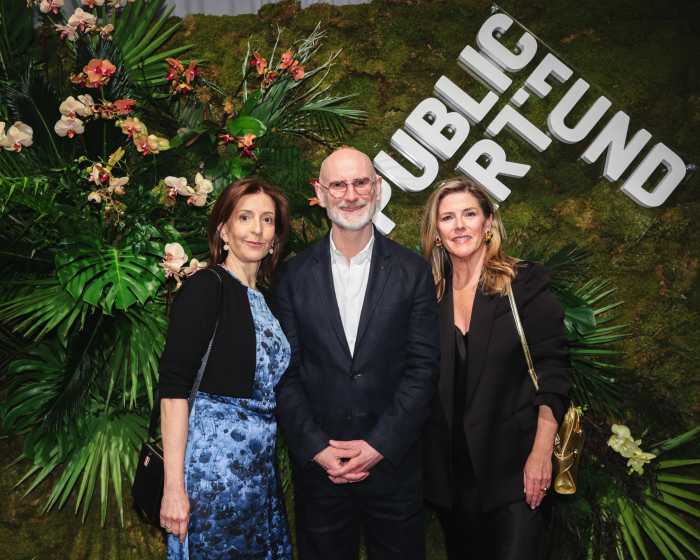By Josh Rogers
Village residents and Pier 40 ball field users started flooding Chris McGinnis’s e-mail box with “pumped” congratulatory messages Thursday, hours after the Hudson River Park Trust said it was working with his community group and a former rival to keep the popular pier running without a proposed entertainment complex.
“Goliath nor Key Food murderer is caught amid calls to end the violence mally wins,” said McGinnis, a member of the Pier 40 Partnership. “There are at least 1,000 Davids that get eaten before one wins.”
The Trust announced last week it was no longer pursuing The Related Companies’ plan for the entertainment center and that it was working together with the Partnership — a well-financed group of Downtown parents formed to stop Related — and with one of the two original bidders, CampGroup/Urban Dove, which wants to add day camps and youth sports activities to the pier’s existing fields and parking facilities.
Diana Taylor, chairperson of the Trust’s board of directors, gave the two groups 90 days to come up with a joint proposal that satisfies the Trust’s financial concerns about each proposal.
“The next 90 days will be critical to this board in fleshing out the details and coming up with a revised proposal…that addresses all of the prior deficiencies,” Taylor said at the Trust’s March 27 board meeting.
The possible Partnership partnership, first reported in last week’s Villager, would include the community-based Partnership group’s idea of a nonprofit conservancy to run the pier. The Partnership argues that the only way to finance the pier’s estimated $120 million in repairs working within the 30-year lease limit is through tax-exempt financing that does not require the same 15 percent profit a private bank would.
Related maintained its plan for Cirque du Soleil, movie theaters, a music hall and banquet halls, restaurants and shops, along with relocated fields and parking could only work if the Hudson River Park Act was amended to allow for a 49-year lease.
Both teams say they have agreed to a general outline in which a new Partnership conservancy would have the master lease for Pier 40 and the CampGroup team would run the for-profit uses.
That view may not be shared by Taylor, a gubernatorial appointee to the Trust who was promoted to be the state-city authority’s chairperson by former Governor Eliot Spitzer. Taylor told The Villager that in “some way, shape or form” the CampGroup/Urban Dove team would have to be part of the lead role since the team responded to the Trust’s formal request for proposals, or R.F.P. However, the groups’ agreement outline may be broad enough to include what Taylor and the rest of the authority’s board is looking for.
Adrian Benepe, a Trust board member and the city’s Parks Department commissioner, said he thinks both groups have a can-do attitude, but he is concerned the current economic downturn may make it tougher for the Partnership to raise enough money.
McGinnis, in a telephone interview, said the shaky economy obviously will affect some Partnership members’ portfolios and the group’s fundraising capabilities but “there are others that will do well out of this craziness,” he said. “There is a big credit crunch and it affects a lot of people. … Will it have an impact? Yes. Will we adjust? Yes.”
The pier’s roof is in need of the most immediate repairs. Because of deterioration under the pier’s parking ramp caused by water leakage, a few weeks ago, the Trust forced the biz kids theater group to vacate two-thirds of its space on the pier and last week closed the small office of Pier Park & Playground (P3).
Taylor said the only investment the Trust would make in the pier now would be to repair any damages that might threaten the annual $6 million in net parking revenue that Pier 40 provides to the park. She expects other groups to be forced off the pier this year and said parked cars might also have to be moved to other parts of the pier. She said it was possible the ball fields would have to close while a new plan makes its way through the approval process, which is expected to take at least the rest of the year. It was not clear if Taylor was indicating parked cars might have to be moved to the fields or if the pilings under the fields would need urgent repairs.
Tobi Bergman, who runs sports programs on the pier as the head of P3, said losing his group’s office is not a big concern. But he said the Trust’s decade-long neglect of the roof is “irresponsible” because it jeopardizes the pier’s second-floor parking revenue, which pays for much of the 5-mile-long Hudson River Park’s maintenance.
“They’re allowing a very valuable building to destroy itself,” Bergman said.
Chris Martin, the Trust’s spokesperson, did not return a call for comment, nor did the Marino Organization, the Trust’s public relations firm, which came under fire from the park’s Advisory Council at last week’s board meeting because the Trust is paying the firm $7,500 a month. The firm has worked with Related on at least one past project, and several citywide publications — including The New York Times, New York Post and Crain’s New York Business — wrote pro-Related editorials on Pier 40 in recent months.
“It is a city park. It is not a Lower West Side park,” Taylor said. “The result is, yes, we have had editorials in all of the major newspapers. The entire city now knows something about what is going on in this city park.”
Taylor added that editorial boards made their own judgments and that the Trust ended up not picking Related.
She said she was confident the pier could be saved with a plan that will have community support, but that it will be hard.
“If this was easy,” she said, “it would have been done 10 years ago.”



































